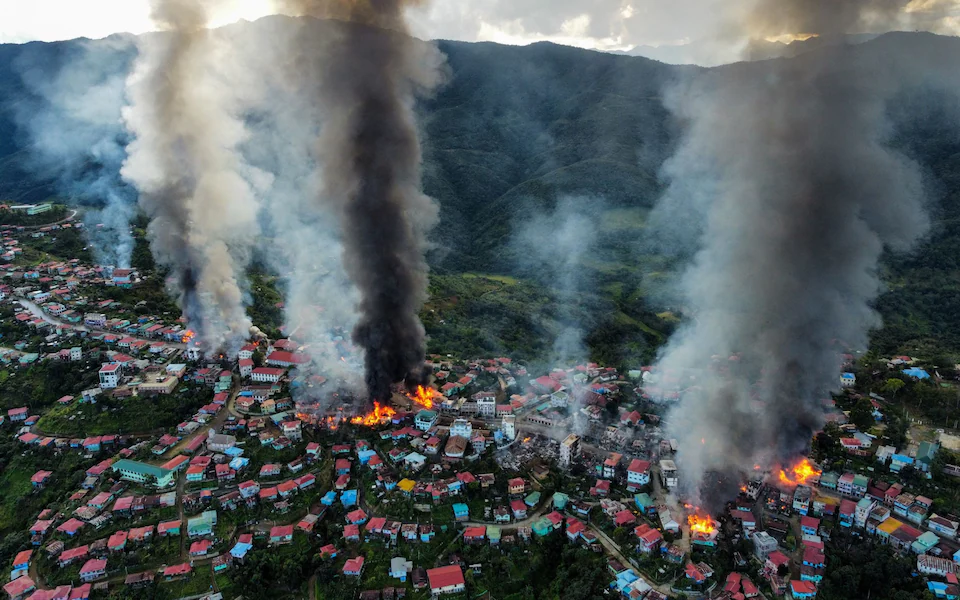Coverage of SAC-M’s report Fatal Business: Supplying the Myanmar Military’s Weapon Production in the Telegraph.
At least 13 countries are ‘enabling Myanmar’s military’ to manufacture a vast array of weapons
Materials, machinery and know-how is being used to commit atrocities against its own people, says report into the junta’s weapons production
By Sarah Newey
16 January 2023
Companies from at least 13 countries, including the US, are “enabling the Myanmar military” to manufacture a vast array of weapons used to commit atrocities against its own people, international researchers have found.
According to a new report tracing the supply chains involved in the junta’s weapon production operations, the military has used materials, machinery and know-how from dozens of companies in nations including Germany, Austria, Singapore and America.
“Foreign companies are enabling the Myanmar military – one of the world’s worst human rights abusers – to produce many of the weapons it uses to commit daily atrocities against the Myanmar people,” said Yanghee Lee, the UN’s former Special Rapporteur on Human Rights, and one of the authors of the 75-page report.
“Foreign companies and their home states have moral and legal responsibilities to ensure their products are not facilitating human rights violations against civilians in Myanmar. Failing to do so makes them complicit in the Myanmar military’s barbaric crimes,” she added.
The research – produced by the Special Advisory Council for Myanmar (SAC-M) and based on sources, including leaked military documents, interviews with former soldiers and shipping records – added that the junta has stepped up weapons production since it seized power in February 2021.
In the coup, which ousted the elected government, the military has used lethal and indiscriminate force in an attempt to suppress opponents, and has been accused of committing “gross human rights violations, amounting to crimes against humanity”.
Though likely a vast underestimate, more than 2,700 civilian fatalities have been documented by the Assistance Association for Political Prisoners, including 277 children. And at least 13,000 people have been detained in a brutal crackdown on dissent.
The majority of weapons used are manufactured domestically by companies controlled by the Ministry of Defense and Directorate of Defense Industries. Despite some Western-led sanctions, the SAC-M found the supply chains enabling these factories are directly or indirectly supported by companies in the US, Europe, Asia and the Middle East.
This includes the Austrian company GFM Steyr, which is believed to have provided the high precision machines needed to manufacture gun barrels. When these need maintenance, they are reportedly shipped to Taiwan, where GFM technicians fix them, before being returned to Myanmar.
Targeted sanctions
The company did not respond to a Telegraph request for comment, and the SAC-M said it was unclear whether technicians are aware that they are working on weapons that could be implicated in abuses in Myanmar.
Other companies named include ST Kinetics from Singapore, which is said to have transferred a “prefabricated factory” to Yangon to manufacture small arms, and Dassault Systèmes in France. The report said the company supplied 3D electromagnetic simulation and analysis software, and computer aided design software for 3D modelling.
Meanwhile, researchers said Germany’s Siemens Digital Industries Software supplied multiple types of software, India’s Tonbo Imaging provided elements for thermal sniper rifles, and Ukraine’s Ukrspecexport was involved in the transfer of technology to produce 2SIU self-propelled howitzers, BTR-4 armoured personnel carriers and MMT-40 light tanks.
The weapons manufactured are for use in Myanmar in a network that has grown in recent decades – from roughly six factories, known as ‘KaPaSa’, in 1988, to 25 today. Currently there are no signs that the country is exporting arms.
Chris Sidoti, an author of the report, human rights lawyer and member of UN’s Independent International Fact-Finding Mission on Myanmar from 2017 to 2019, said companies must be held accountable.
“Weapons produced at the Myanmar military’s KaPaSa factories have been used to commit human rights atrocities for decades,” he said.
“States must investigate and, if necessary, initiate administrative or legal proceedings against companies whose products we have identified as enabling the DDI to produce weapons used by the Myanmar military in its indiscriminate attacks on civilians.”
Marzuki Darusman, another author who was also part of the fact-finding mission, added that the UN should do more to tighten and enforce sanctions.
“The Myanmar military has built a robust arms manufacturing industry that makes it largely self-sufficient in its ability to produce the small arms, light weapons and ammunition it uses to brutally suppress the Myanmar people. However, the DDI’s reliance on external supplies to sustain its weapon production means it is still vulnerable to external pressure,” he said.
“UN member states should do everything in their power to restrict the Myanmar military’s access to those supplies to protect the Myanmar people, including by adopting targeted sanctions against the KaPaSa, its leadership and its network of brokers.”


